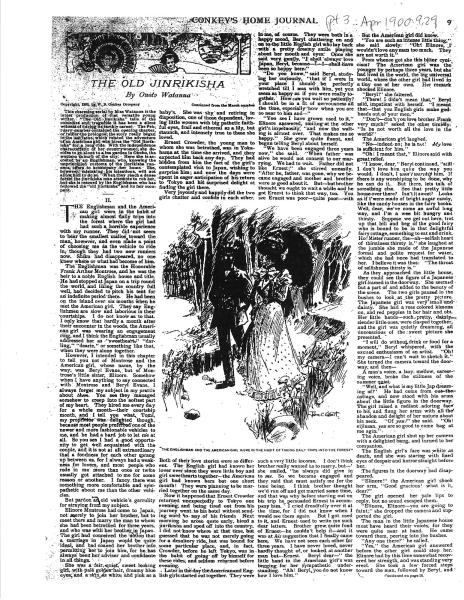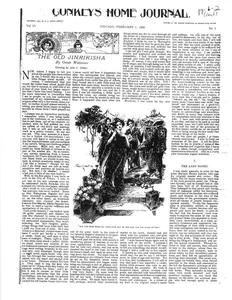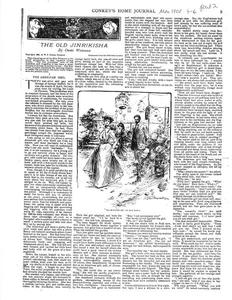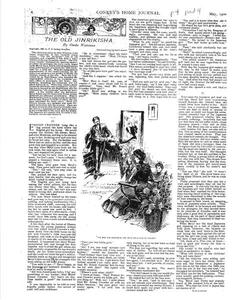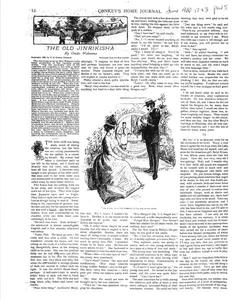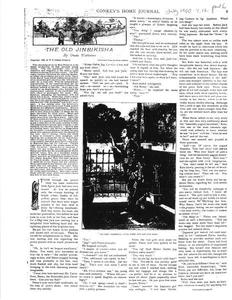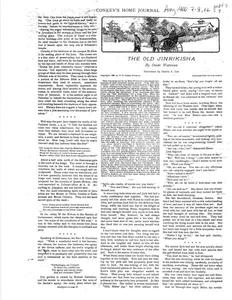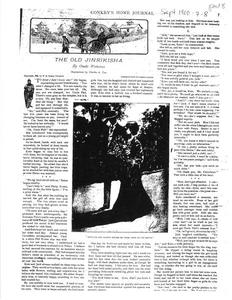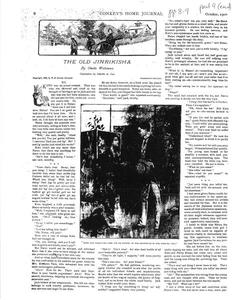II.
The Englishman and the American girl were in the habit of making almost daily trips into the forest where the girl had had such a horrible experience with my runner. They did not seem to bear the smallest malice toward the man, however, and even made a point of choosing me as the vehicle to ride in, though they had two new runners now. Shiku had disappeared; no one knew where or what had become of him.
The Englishman was the Honorable Frank Arthur Montrose, and he was the heir to a noble English house and title. He had stopped at Japan on a trip round the world, and liking the country full well, had decided to pitch his tent for an indefinite period there. He had been on the island over six months when he met the American girl. They say Englishmen are slow and laborious in their courtships. I do not know as to that. I only know that hardly a month after their encounter in the woods, the American girl was wearing an engagement ring, and I think the Englishman usually addressed her as “sweetheart,” “darling,” “dearie,” or something like that, when they were alone together.
However, I intended in this chapter to tell you not of Montrose and the American girl, whose name, by the way, was Beryl Evans, but of Montrose’s little sister, Elinore. Somehow when I have anything to say connected with Montrose and Beryl Evans, I always forget my subject in my prattle about them. You see they managed somehow to creep into the softest part of my heart. They hired me every day for a whole month—-their courtship month, and I tell you what, Tomi, my proprietor, was delighted though, because most people preferred one of the newer and more fashionable vehicles to me, and he had a hard job to let me at all. So you see I had a good opportunity to get well acquainted with the couple, and it is not at all extraordinary that a fondness for each other sprang up between us, for I always had a weakness for lovers, and most people who rode in me more than once or twice usually got attached to me for some reason or another. I fancy there was something more comfortable and sympathetic about me than the other vehicles.
But pardon an old vehicle’s garrulity for straying from my subject.
Elinore Montrose had come to Japan, not merely to join her brother, but to meet there and marry the man to whom she had been betrothed for three years, and who was with her brother in Japan. The girl had conceived the notion that a marriage in Japan would be quite ideal, and had coaxed her brother into permitting her to join him, for he has always been her adviser and confidant in all things.
She was a fair, quiet, sweet looking girl, with pale golden hair, dreamy blue eyes, and a skin as white and pink as a baby’s. She was shy and retiring in disposition, one of those dependent, loving little women with big pathetic faithful eyes, frail and ethereal as a lily, but staunch, and intensely true to those she loved.
Ernest Crowder, the young man to whom she was betrothed, was in Yokohama at the time she arrived, and they expected him back any day. They had hidden from him the fact of the girl’s contemplated visit to Japan, wishing to surprise him; and now the days were spent in eager anticipation of his return to Tokyo and his surprised delight at finding the girl there.
Very joyously and happily did the two girls chatter and confide in each other. Both of their love stories were so different. The English girl had known her lover ever since they were little boy and girl sweethearts together—-the American girl had known hers but one short month! They were planning to be married together on the same day.
Now it happened that Ernest Crowder returned unexpectedly to Tokyo one evening, and being tired out from his journey went to his hotel without sending word to any of his friends. Next morning he arose quite early, hired a jinrikisha and sped off into the country. I did not know where at the time, but guessed that he was not merely going for a desultory ride, but was bound for some particular place, and, in fact, Crowder, before he left Tokyo, was in the habit of going off by himself for those rides, and seldom returned before evening.
Later in the day the American and English girls started out together. They were in me, of course. They were both in a happy mood, Beryl chattering on and on to the little English girl who lay back with a pretty dreamy smile playing about her mouth and eyes. Once she said very gently, “I shall always love Japan, Beryl, because—-I—-I—-shall have been so happy here.”
“Do you know,” said Beryl, studying her curiously, “that if I were in your place I should be perfectly wretched till I was with him, yet you seem as happy as if you were really together. How can you wait so patiently? I should be in a fit of nervousness all the time, especially now when you are so near to him and—-”
“You see I have grown used to it,” Elinore answered, smiling at the other girl’s impetuosity, “and now the waiting is almost over. That makes me so happy.” She grew quite fluent, and began telling Beryl about herself.
“We have been engaged three years now,” she said. “When father was alive he would not consent to our marrying. We had to wait. Father did not like Ernest;” she stirred uneasily.“After he, father, was gone, why we became engaged and mother and brother were so good about it. But—-but brother thought we ought to wait a while and he got Ernest to think that way, too. You see Ernest was poor—-quite poor—-with such a very little income. I don’t think brother really wanted us to marry, but—-” she smiled, “he always did give in to me. So we became engaged and they said that must satisfy me for the time being. I think brother thought we’d run off and get married some time, and that was why before starting out on his trip he persuaded Ernest to accompany him. I cried dreadfully over it at the time, for I did not know when I would see them again. But I got used to it, and Ernest used to write me such dear letters. Brother grew quite fond of Ernest—-he couldn’t help it—-and it was at his suggestion that I finally came here. We have not seen each other for three years. I have never loved, never hardly thought of, or looked at another man but—-Ernest. Beryl dear—-” the little hand in the American girl’s was begging for her sympathetic understanding. “Ah! Beryl, you do not know how I love him.”
But the American girl did know.
“You are such an intense little thing,” she said slowly. “Oh! Elinore, I wouldn’t love any man too much. They are not worth it.”
From whence got she this bitter cynicism? The American girl was the younger by perhaps three years, but she had lived in the world, the big universal world, where the other girl had lived in a tiny one of her own. Her remark shocked Elinore.
“Beryl!” she faltered.
“There! I didn’t mean that,” Beryl said, impatient with herself. “I meant that—-that you English girls make godheads out of your men.”
“Don’t—-don’t you love brother Frank very much?” asked the other timidly, “Is he not worth all the love in the world?”
The American girl laughed.
“No—-indeed no; he is not! My love is sufficient for him.”
“Oh! I meant that,” Elinore said with great relief.
“I know, dear,” Beryl continued.“Still, I don’t love him quite the way you would. I don’t, I won’t worship him. If there is any worshiping to be done, why, he can do it. But there, let’s talk of something else. See that pretty little house over there? Isn’t it sweet? Looks as if t’were made of bright sugar candy, like the candy houses in the fairy books. Well, dear, we’ve come an awful long way, and I’m a wee bit hungry and thirsty. Suppose we get out here, trot up that hill and beg of the good fairy who is bound to be in that delightful fairy cottage, something to eat and drink. Ho! Mister runner, the—-ah—-selfish heart of thirstiness thirsty is,” she laughed at the jumble she made of the Japanese formal and polite request for water, which she had once had translated to her. I believe it was thus: “The throat of selfishness thirst is.”
As they approached the little house, they could see the figure of a Japanese girl framed in the doorway. She seemed but a part of and added to the beauty of the scene. The two girls paused in the bushes to look at the pretty picture. The Japanese girl was very small and dainty. She had a rose colored kimono on, and red poppies in her hair and obi. Her little hands—-such pretty, dainty, slender little ones, were clasped together, and the girl was quietly dreaming, all unconscious of the sweet picture she presented.
“I will do without drink or food for a moment,” Beryl whispered, with the excited enthusiasm of an artist. “Oh! my camera—-I can’t wait to sketch it.” She turned the camera toward the doorway, and then—-
A man’s voice, a lazy, mellow, caressing voice, broke the stillness of the summer quiet.
“Well, and what is my little Jap dreaming of?” He had come from out the cottage, and now stood with his arms about the little figure in the doorway. The girl raised a radiant adoring face to his, and flung her arms with all the abandon and delight of her nature about her neck.“Of you!” she said. “Oh! eijin-san, you are so good to come bag at me agin.”
The American girl shut up her camera with a delighted bang, and turned to her companion.
The English girl’s face was white as death, and she was staring with fixed eyes of despair and horror straight before her.
The figures in the doorway had disappeared.
“Elinore!” the American girl shook her arm, “Good gracious! what is it, dear?”
The girl opened her pale lips to reply, but no sound escaped them.
“Elinore, Elinore—-you are going to faint.” She dropped the camera and supported the girl.
The man in the little Japanese house must have heard their voices, for they were quite near at hand. He came toward them, peering into the bushes.
“Any one there?” he called.
“Yes,” the American girl answered before the other girl could stop her. Elinore had by this time somewhat recovered her strength, and was standing very erect. She took a few forced steps toward the man, followed by Beryl, and
29
there in the open, right before the little Japanese woman, who had quietly joined the man, she faced him. Had a wraith suddenly arisen from the grave the man could not have grown whiter or shown more abject fear and consternation. For a long moment no one spoke a word. Then the man took a step toward the English girl, his arms half outstretched.
“Elinore,” he said, and the piercing tenderness in his voice was not feigned. But the girl withered him with a look of utter scorn.
“Don’t dare—-dare touch me,” she said in a passionate whisper. “No—you—.” She could say no more—-but stood still in the path, a white, accusing, dumb figure.
In a flash the American girl understood. She placed herself before the trembling English girl, and her voice vibrated with her scorn.
“No—don’t—-dare—-touch—-her-—you—-you hound!” she cried.“Oh! we are only women. We can’t answer or speak to you—-such as you, but—-Elinore has a brother—-she—-. Ah!” she changed her tone;“Don’t think that Elinore wants you—-you. She don’t. She would not touch you with a stick.”
The man ignored her. All his mind and heart were centered on the other girl.
“Elinore, forgive me. I can explain—-”
The English girl was weakening. She would have broken down but for her friend. That young woman was burning with indignation sufficient for both of them.
“Who is that Japanese woman?” she demanded.
Again the man ignored her, his eyes fixed imploringly on Elinore.
Beryl turned to the Japanese girl, who had been regarding them all with puzzled eyes.
“Who is he? What is he to you?” she demanded imperiously.
The Japanese girl smiled. She looked with great pride at the man, and then—-“Aa! Tha’s Mister Ernest Crowder. Tha’s my hosban’. Me? I Mrs. Ernest Crowder—-tha’s me. How nize thad is!”
“No, no!” the man burst out fiercely, “It is not true. It was a—-I—-”
“We understand,” Beryl said, with cold contempt. “A Japanese marriage! We, Elinore and I, consider it as binding as any other, and—-but we are wasting our time on you. Come, Elinore,” she turned to the girl, “Let us leave Mr. and Mrs. Crowder.” The man attempted to stay them. He caught hold of Elinore’s hand, and held on to it desperately. The American girl’s voice was relentless as fate.
“For Elinore’s sake we would keep it from her brother, but, if you dare to hold us—-her—-I’ll tell him everything, and he will thrash you within an inch of your life,” she said slowly.
The man’s excitement had vanished somewhat. He held himself in check.
“Who are you and what business is it of yours? You have no proof of anything against me—-and Elinore, my Elinore, would not turn against me.”
“No proof?” the girl echoed, scornfully. “As soon as I get home I will develop and send you proofs of a certain picture I took of you and that Japanese woman in the doorway.”
The man had turned a sick gray color. He did not try to hold them after that. Not one word did the English girl say all the way home. Beryl held the dumb white figure in her arms, and begged her to say something—-if only a word—-but the girl seemed as if turned to stone, and sat looking straight before her, with a white, set countenance. She did not even hear the other girl’s voice, for hearing, speech, memory—-all seemed to have gone. When they reached the hotel, the American girl alighted first. Montrose was at the door, and went down to the gate to meet them. He saw the figure in the vehicle and staggered back as if shot.
“My God!”
“She—-it is—-a sunstroke,” the American girl began, and broke down. “Oh, no, no,” she wailed, “You shall know the truth—-she—-she has seen him.”
“Him?”
“Yes—-Ernest Crowder.”
“And?”
“I will show you something that will explain to-morrow.”
